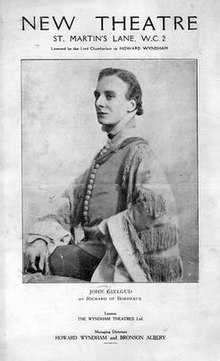Richard of Bordeaux (play)
| Richard of Bordeaux | |
|---|---|

Programme cover depicting Gielgud as Richard
|
|
| Written by | Gordon Daviot |
| Date premiered | 1933 |
| Place premiered | Arts Theatre |
| Original language | English |
| Subject | King Richard II tries to maintain peace in England |
| Genre | Period piece |
| Setting | Medieval England |
Richard of Bordeaux (1932) is a play by "Gordon Daviot", a pseudonym for Elizabeth MacKintosh, best known by another of her pen names, Josephine Tey.
The play tells the story of Richard II of England in a romantic fashion, emphasizing the relationship between Richard and his first wife, Queen Anne of Bohemia. The play was a major hit in 1933, playing a significant role in turning its director and leading man John Gielgud into a major star. Audiences found its portrayal of medieval characters speaking like modern people refreshing.
(In order of their appearance)
Daviot wrote the play after seeing John Gielgud play Shakespeare's Richard II at the Old Vic Theatre, and submitted it to him for production. Gielgud had reservations about the play but agreed to test it out for two performances at the Arts Theatre.
Gielgud finally recognised the play's potential and directed it with himself as Richard at the New Theatre in February 1933. Prior to that production, Gielgud was regarded as a highly respected classical actor based on his performances at the Old Vic, but the overwhelming success of Richard of Bordeaux catapulted him into the status of superstar. The play ran for over a year in the West End (a substantial run for its time).
At the time the play was compared to George Bernard Shaw's Saint Joan, which was also noted for the refreshingly modern and lighthearted language with which the medieval characters were portrayed speaking. The play depicts Richard in the light of the pacifism that was prevalent at the time, after the carnage of World War I. Richard is portrayed as a gentle, refined individual in a brutal militaristic culture, whose "struggle for peace is fine and ennobling". The depiction of Richard intentionally diverged radically from Shakespeare's portrayal of him as a self-dramatising narcissist preoccupied with his divine right to rule.
...
Wikipedia
